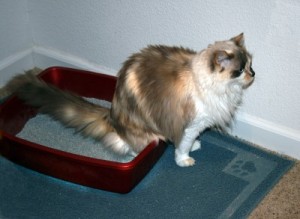Cats are mysterious. There’s no doubt about it. They were domesticated fairly recently when compared to dogs and so many of their behaviors are still somewhat feral and wild. Here are 3 common cat behaviors and what they mean!
Unexpected “Gifts”
Many cat people have received unexpected gifts from their cats, like mice, moles, birds or even snakes, both alive and deceased. Why does your cat do that? There are a few theories about this behavior. One is that they are trying to show you how to hunt. Another is that they are sharing their catch with the others in their colony, which means you. Either way, consider it a compliment and set any live animals free and give kitty a treat for a job well done.
Inappropriate Urination
Finally one of the most frustrating behaviors to deal with is spraying and  urination outside of their litter box. First, remember animals do not do things out of spite but because of instinct or learned behavior. Many times a spraying cat is suffering with a health issue like crystals in their urine, urinary tract infections or kidney issues. If they are not neutered or spayed they are marking their territory to encourage other cats to come around and make more kitties. It could also be simply they do not like the placement of their litter box. Make sure their box is in a quiet place with little or no foot traffic and away from the prying snout of any dogs in the home. You may also want to try different brands of litter including unscented litter. Many litters contain a great deal of perfume. Cats have an extremely sensitive sense of smell and therefore may be put off by the strong fragrance of kitty litter. Try the unscented varieties and make sure that you are cleaning the litter box daily. Remember, you flush your toilet after each use. Be sure to give your kitty the same courtesy by cleaning it’s litter box at least once per day – if not more often.
urination outside of their litter box. First, remember animals do not do things out of spite but because of instinct or learned behavior. Many times a spraying cat is suffering with a health issue like crystals in their urine, urinary tract infections or kidney issues. If they are not neutered or spayed they are marking their territory to encourage other cats to come around and make more kitties. It could also be simply they do not like the placement of their litter box. Make sure their box is in a quiet place with little or no foot traffic and away from the prying snout of any dogs in the home. You may also want to try different brands of litter including unscented litter. Many litters contain a great deal of perfume. Cats have an extremely sensitive sense of smell and therefore may be put off by the strong fragrance of kitty litter. Try the unscented varieties and make sure that you are cleaning the litter box daily. Remember, you flush your toilet after each use. Be sure to give your kitty the same courtesy by cleaning it’s litter box at least once per day – if not more often.
The next time you bring your cat to the vet, mention any odd behaviors. These could be symptoms of a health issue that may need treatment.
Snoozing All Day
Ever wonder why your cat sleeps so much? Cats sleep away about 70 percent of their lives. Snoozing as much as 18 hours a day is normal for an adult house cat. However, if they regularly refuse to play or eat consult your vet and take your cat in for a check-up especially if they are overweight or looking thin with a poor coat. These could be signs of a health issue!
A sure sign that your cat isn’t feeling well is if they stop eating. When in doubt – always check with your vet.
If you liked this post you might enjoy learning about whether or not drooling is normal in cats or why your cat may be a monster at mealtime.